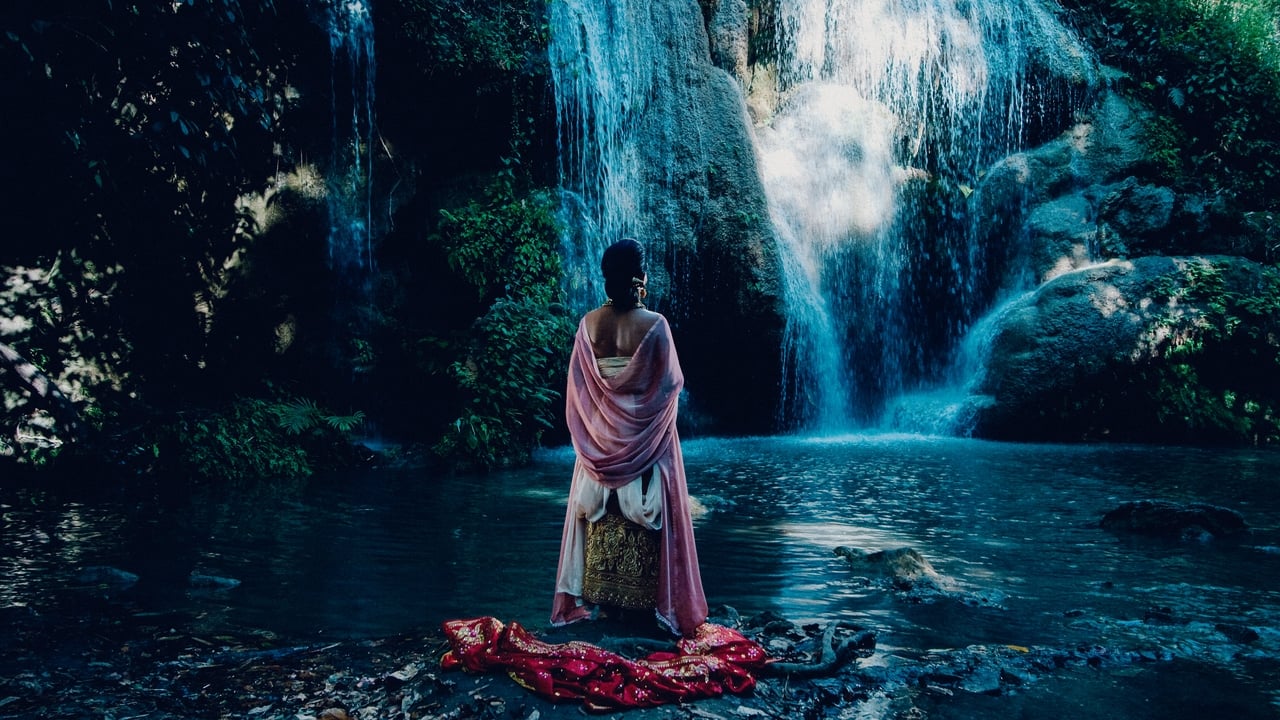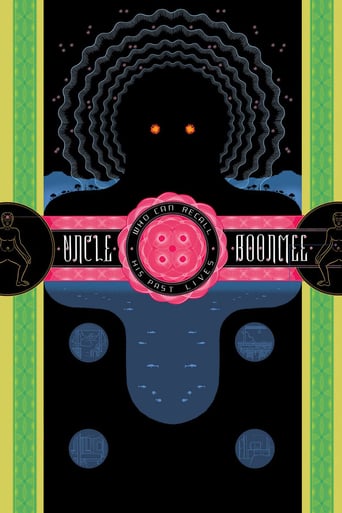

Too many fans seem to be blown away
... View MoreThe greatest movie ever made..!
... View MorePlot so thin, it passes unnoticed.
... View MoreSimple and well acted, it has tension enough to knot the stomach.
... View MoreTen wins in overall twenty film awards nominations including the Golden Palm on 2010 Cannes Film Festival and the Best Film award on Asian Film Awards in 2011; the comprehensive collaboration in film-making of six countries and the World Cinema Fund have significantly heightened the expectations about this movie. However, the controversial feedback from the audience and the already existing reputation of a director Apichatpong Weerasethakul of as preferring unconventional narration style gives us a clue that the picture is still not for large masses. In fact, I have never seen such a pellicular expression of terms, full of art house devices in a genre of half-fantasy. The thoughts after watching this film are so ambiguous that you need to take some time to really make your mind about the picture. The storyline constructs around the last days of a Thai farmer Boonmee who is suffering from kidney failure. Realizing all the seriousness of a situation Boonmee in Thai traditions decides to spend some time with his family to get all the affairs in order. His passed wife's sister Jen and her son Tong comes from the city take care of him. One night while eating a dinner they are joined by the spirits of wife and the monkey-like creature in which his long-missing son had turned in. They had a warm conversation about the afterlife and about their past. Next day the narration continues without any changes except that the spirit of Boonmee wife is accompanying the husband in material form even helping him with a dialysis. The narration is abruptly interrupted by the scene of some unknown India princess seeking for a glimpse of her past beauty in a mysterious fountain. That story is in no way connected to main plot where the action passes the turning point of Boonmee with his family wandering into the cave at the hilltop where he realizes that it is the birthplace of is first life and passes away in peace. Although at first sight the main plot might seem lacking any singularity and original idea, in my opinion, it should be considered broken down into the smaller episodes each of them having its own moral. First one is the parable about the futility of life and the purity of soul. Even when the spirit of his wife tells Boonmee about his soon death he accepts it without any unrest. Here we see an element of a Buddhist religion where death is not considered as the complete end but a transition to next stage of existence. Also, the fact that all the family members were not at all excited by the appearance of their dead relatives is a reference to a Thai belief that dead souls are among us and some of them may appear in form of ghosts and spirits. The next main thought is the all-embracing concept of karma passing throughout the entire plot and fully unfolding in the scene where Boonmee sitting under the awning with Jen tells her that his illness is a result of his bad karma because he killed too many people at war and even too many insects on his farm. Jen responds telling that the main thing about the karma is the intentions of a person and his conciseness again referring to Buddhist principles. The falling action where Boonmee went into the jungle saying that he does not know yet what is his destination is like an allegory on the human life wandering in search of his predestination. On the other hand, from the Buddhist perspective, it is the illustration of a turning point where you have to abandon all your possessions to find the real salvation in enlightenment. The hypocrisy in the epilogue where nephew who became a monk and does not follow the rules suggest that some personality in religion does not acknowledge the religion, while some ordinary people like Boonmee are much more enlightened. Unfortunately, except the work of a director, the contribution of other participants is not likely to be such extraordinary. The filming and editing are fully made of long, one-shot scenes with big pauses between the replicas and actions. Although this is a part of an initial plan to make the movie slow-pacing and hasteless in Asian traditions, eventually, it acts against it on a broad range discouraging potential viewers. Scripts are also extremely ordinary - all the scenes are almost completely filled with everyday common conversations. In such case, non-professional actors not performing any outstanding acts and not showing any intricate emotions seem to perfectly suit into the cast. However, composition of long shots of scenes of nature and the permanent soundtrack of cricket and forest sounds add to the perception of rural areas and the local Thai population's life. The reason why the viewers and critics are so controversial about this movie is that it lacks a conventional plot and has a specific narration style. In order to understand the core ideas of a story person has to have at least a basic knowledge of the Buddhist religious principles and Thai traditions. Unprepared views would probably stop watching not reaching the middle because of ambiguousness and slow pace of the picture. But the real understanding ideas Weerasethakul was promoting as karma, the meaning of life and its severities comes only after deep rethinking. The film is an antithesis for the western understanding of an industry and is a claim for evolving global cultural multipolarity. I believe that it could not be shot in a different "more pleasant to ordinary viewer" manner as it would have lost its Eastern identity. I can say that I really enjoyed watching this movie as it is out a line of common products we are consuming nowadays. The whole "universe" of a movie makes you think both while and after the watching.
... View MoreThis film tells the story of a farm owner who lives in a rural village in Thailand. He has kidney problems and needs to have peritoneal dialysis, and he thinks his end is near. One day, his wife's ghost and a furry creature who claims to be his late son visit his home.I have wanted to watch "Uncle Boonmee Who Can Recall His Past Lives" for a long time because it is hailed to be great by film festivals. In just the first few minutes, I was already bored to death. It shows a cow wandering in the wild, and that lasted for minutes. It does not get any better from then on, nothing happens in the film. It is so slow in pace, and the still shots do not help. The story is so lacking that it could be told in ten minutes. The rest of the 100 minutes were fillers with no real substance. It is truly horrible, I wasted so much time on this film.
... View MoreI'll be frank. Whether or not you enjoy this movie will depend largely on whether or not you are a die hard film buff or a casual movie goer looking for a story. If you are the later, then aside from the eerie sight of the red eyed Monkey Spirits, you will come away disappointed.That said, there is much in Uncle Boonmee to like, but like the Buddhist aesthetic the film is steeped in, you have to be ready for it. Because this is one film that demands a lot of patience of the viewer.Set in rural Isan Province, Thailand, the story follows the last days of a well to-do farmer, the titular Boonmee, who is dying of a terminal illness. Like all dying men, Boonmee can't help but wax philosophic, both on the nature of death itself and on his own past mistakes, and one night while eating with his family is suddenly and abruptly joined by two spirits, the first of his dead wife, Huay, the second that of his missing son, Boonsong, who has inexplicably been transformed into a black monkey. Anyone even remotely familiar with the prior work of Director Weerasethakul (try saying that with a mouthful of marbles), particularly Tropical Malady, will know that such surrealism is a common theme in his films, with its signature mix of traditional Thai Buddhism and animist lore. As in Tropical Malady, the day belongs to the living and the mundane, but night brings on ghosts, animal spirits, the shades of ancestors, and the inner musings and anxieties of Weerasethakul's characters.The film itself feels much like a Buddhist temple; with its long uninterrupted and unadorned shots, and its devotion to capturing trivial moments, it is not so much a vehicle for storytelling as contemplation. The last film to be shot with celluloid as opposed to digital, it is the director's self-admitted funerary ode to a dying medium.
... View MoreAll the performances are very good (with my usual caveat that it's hard to judge a performance in a language alien to me). I loved the way the characters all took the appearances of ghosts in their stride; like it's an everyday occurrence. This gave the film a very natural flow that added to its magic. I don't profess to understand it all by any stretch of the imagination, but it was well made and I loved the ending that was really unexpected (no clues here).SteelMonster's verdict: RECOMMENDEDMy score: 7.7/10You can find an expanded version of this review on my blog: Thoughts of a SteelMonster.
... View More